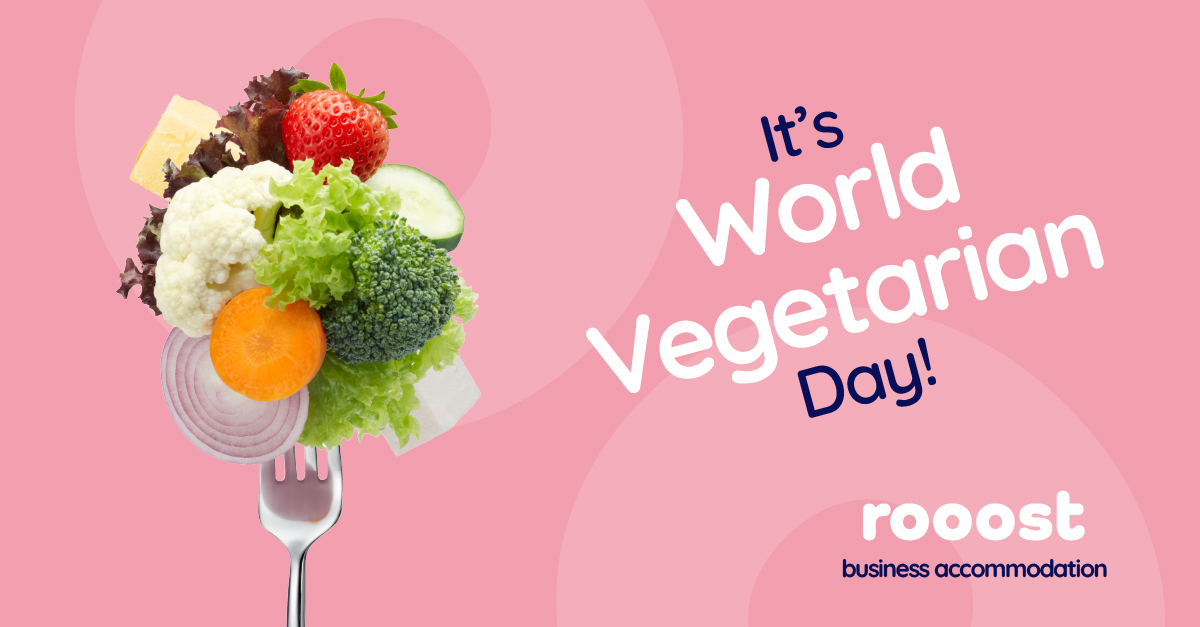Celebrating World Vegetarian Day

A well-balanced diet provides all of the energy you need to keep active throughout the day; provides nutrients you need for growth and repair; contributes to you staying strong and healthy and helps to prevent diet-related illness, such as some cancers. Today we celebrate World Vegetarian Day – commemorated every year on October 1st – that, whilst isn’t for everyone, is represented by about 10% of the world's population. And more people are making changes in their lifestyles to be more sustainable and healthy and eat less meat!
What is a vegetarian diet?
For vegetarians who eat dairy products and eggs, a healthy diet is the same as for anyone else, but without meat or fish. The Eatwell Guide shows the different types of food we should eat to have a healthy, balanced diet, and in what proportions. You don't need to achieve this balance with every meal and try to get the balance right over a day, or even a week. Also, choose options low in fat, salt and sugar whenever you can.
A summary of the Eatwell guide is…
Fruit and vegetables
Eat a variety of fruit and vegetables every day – try to eat at least five 80g portions of fresh, frozen, canned, dried or juiced fruit and vegetables a day. As well as vitamins and minerals, fruit and vegetables provide fibre, which can help digestion and prevent constipation. Find out more in 5 A Day: what counts?
Starch and carbohydrates
Starchy foods such as potatoes, bread, cereals, rice and pasta should make up just over a third of the food you eat. Where possible, choose whole grain varieties. You should eat some starchy foods every day as part of a healthy, balanced diet. Starchy foods are a good source of energy and the main source of a range of nutrients in our diet. As well as starch, they contain fibre, calcium, iron and B vitamins.
Dairy (and dairy alternatives)
Dairy or dairy alternatives are needed for calcium. Milk and dairy products, such as cheese and yoghurt, are good sources of protein, calcium and vitamins A and B12.
This food group includes milk and dairy alternatives, such as fortified unsweetened soya, rice and oat drinks, which also contain calcium. Other sources of calcium include green, leafy vegetables, calcium-set tofu and bread.
To make healthier choices, go for lower fat milk and dairy foods. Also choose lower sugar options.
Protein – beans, pusles, eggs and other sources
Pulses include beans, peas and lentils. They're a low-fat source of protein, fibre, vitamins and minerals, and count as a portion of vegetables. Nuts and seeds are also a source of protein and other nutrients.
Pulses are particularly important for people who don't get protein by eating meat, fish or dairy products.
Other non-dairy sources of protein include eggs and meat alternatives, such as tofu, mycoprotein (such as Quorn), textured vegetable protein and tempeh.
You need to eat a variety of different sources of protein to get the right mixture of amino acids, which are used to build and repair the body's cells.
Unsaturated oils and spreads
Unsaturated fats, including vegetable, rapeseed, olive and sunflower oils, are healthier than saturated fats, such as butter, lard and ghee. But all types of fat are high in energy and should be eaten sparingly.
Fats, salt and sugar
Foods in this group mainly provide energy in the form of fats and sugars, but may only provide a very small amount of other nutrients.
Foods high in salt, fat and sugar, such as cream, chocolate, crisps, biscuits, pastries, ice cream, cakes and puddings, should be eaten less often and in small amounts.
What to do on World Vegetarian Day?
If you're not a vegetarian, this is the perfect day to look more into the lifestyle and try it out for the day. Challenge yourself to not eat meat for the day, and try vegetarian food at restaurants in your area that look interesting, so that you can see how delicious vegetarian meals can be. If you decide to try to become a vegetarian, there are many resources online with steps to make the transition easier.
If you are already vegetarian, try to diversify your food so you're not always eating the same thing. There are so many vegetarian recipes around now, experiment with different ones.
You can also try to shop more sustainably and ditch the supermarket for smaller, family-owned grocery stores, and farmers' markets.

 share
share